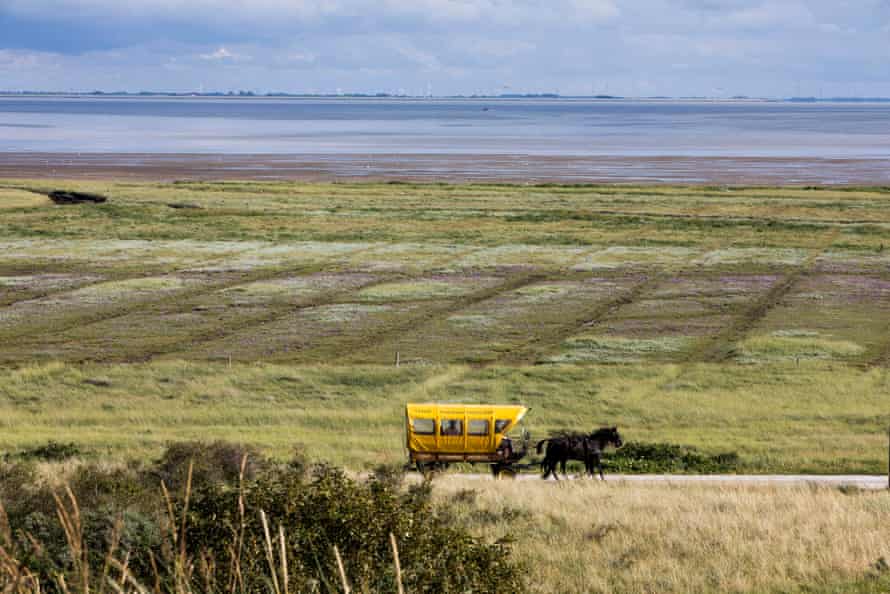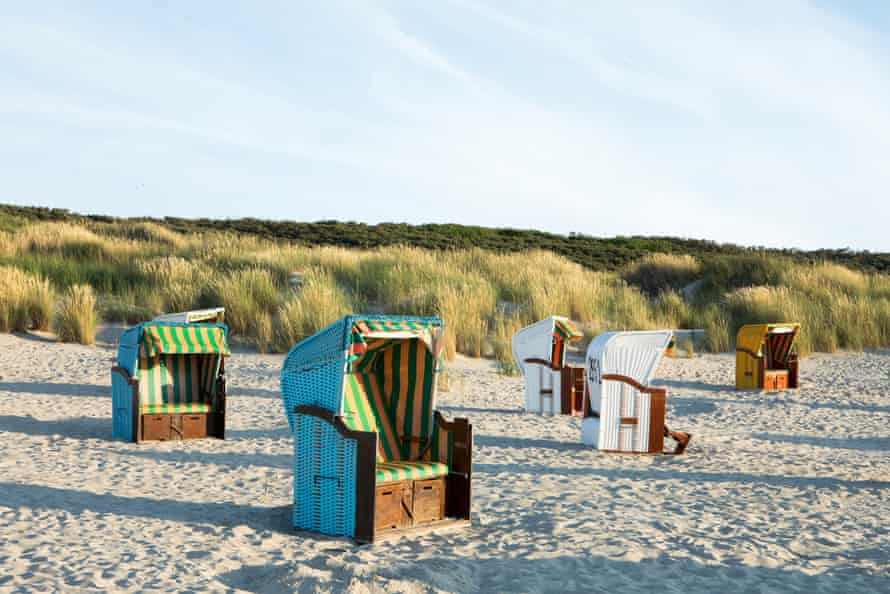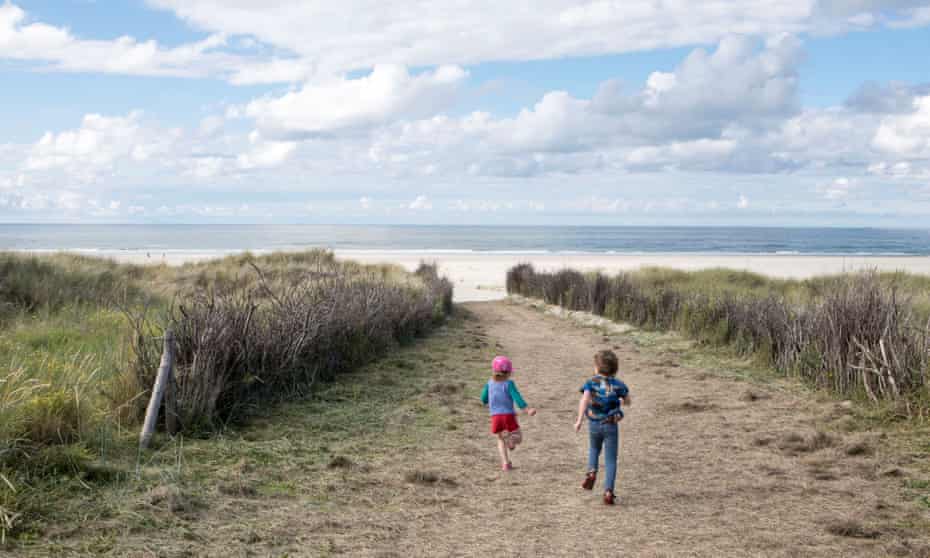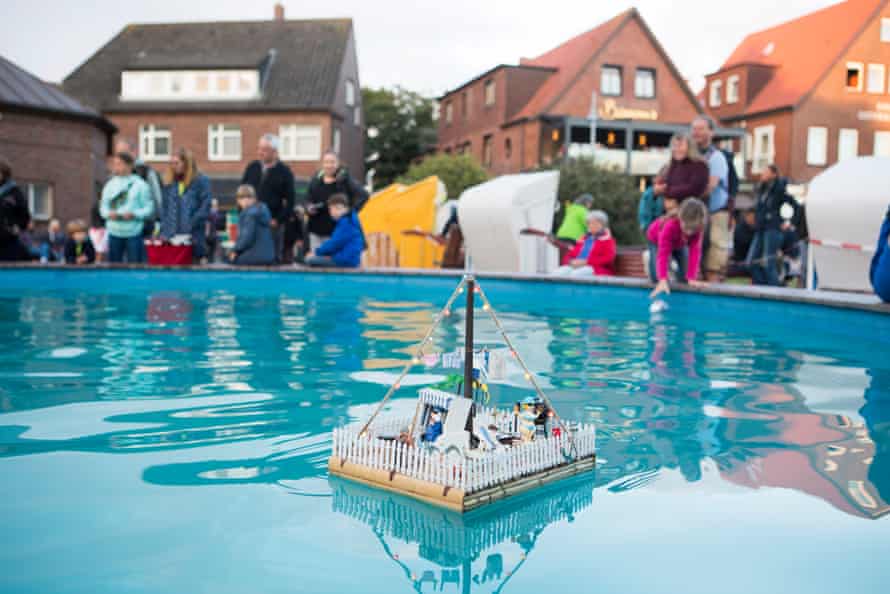My below-average German means I’m struggling for the gist of what our guide, Jens, is saying. It’s not being made easier by my six-year-old making loud farty noises in the mud with his bare feet. I eventually give up but Jens happily summarises in English, and as our small group disperses across the tidal flats, he shows us how to hunt for the treasures beneath the muddy gloop.
We are ankle-deep in the intertidal Wadden Sea, south of Juist (pronounced Yoost), one of the seven East Frisian islands off the north coast of Germany – the area has had Unesco world heritage status since 2009. Jens enthusiastically describes the biodiversity and the 10,000 species of flora and fauna found here, while the six-year-old and his brother get stuck in with their hands to unearth mussels, sea snails and, of particular interest, the Wattwurm (lugworm), whose sandy, spaghetti-like poop litters the muddy desert.
There are only two 90-minute crossings a day – dictated by the tides – to this pretty sliver of an island and as it’s car-free, bikes or horses are the only means of transport. The boys are delighted to find a horse-drawn carriage waiting to take us to Haus Marie-Luise, our seafront guesthouse, a neat, redbrick building, typical of the island, with a long slanting roof under a blue sky.

We arrive at around 6pm, drop our bags and almost run in our excitement to the beach on the north side of the island, to enjoy what is left of the warm golden day. At its broadest point, the island is only 500 metres wide, yet its north coast is as dramatic and exhilarating as its south is calm and contemplative. The North Sea comes crashing on to the beach in delicious rolling, roaring waves, a tempestuous mistress in contrast to the south’s genteel maiden aunt.
A winding wooden boardwalk runs up and over the dunes, giving a magnificent view of the sweeping sandy beach, which runs the 10-mile length of the island. Hundreds of traditional Strandkörbe (basket chairs) are scattered at the foot of the dunes, and beyond them lies 100 metres or so of golden sand before the water’s edge.
Maybe it’s joy at the newfound freedoms, or maybe it’s the glittering light, the roar of the sea, the freshness of the air and the widest of open spaces … but we get a bit carried away. We jump through the waves, we splash and swim, we leap through the dunes, we laugh and spin and marvel at this wondrous place, while all the restaurants on this sleepy little island are quietly closing and the good, practical parents are tucking their little ones into bed.

It’s almost 10pm when we drag ourselves away from the beach. The northern summer light has tricked us and we are turned away from one restaurant after another. Our saving grace is a little white-walled, thatched cottage, a tapas place called Café del Mar. No Ibiza-crazed clubbers here though, just good food, a friendly atmosphere and most importantly, fish fingers and chips for the kids. Both boys almost fall asleep in their tomato ketchup, so after a quick digestif of the island’s Juister gin, we hoist them up and take the short walk back to our guesthouse.
In the morning, we seek out the Otto Leege path through the dunes, named after the naturalist, ornithologist and founder of the bird sanctuary on neighbouring Memmert island. Along the trail are observation posts and interactive artworks, playing with water, air and light – the elements that Juist does so well – and the boys get boisterously involved. Even with these two to corral, the quietude has begun to enter my bones. The landscape, with its beauty and diversity, radiates relaxation. I can feel my shoulders start to drop and I’m aware of the sounds and sights of the natural phenomena around me.

After an ice-cream at Café Wilhelmshoehe, looking out over the stark tidal planes, we walk back along the north beach. I admire the open dune landscape, reminiscent of my childhood holidays in Northumberland. This whole trip is not actually that different from those old family beach holidays: sea and sand, mini-golf, ice-cream, boat trips to see seals and walks along the beach. We arrive back at the central Kurplatz in time to catch a boogie woogie trio on the small stage, which we watch while munching takeaway pizza.
A surprise hit is the small boating pond next to the stage. The boys love watching the miniature craft skim around, and delight in pushing them back into the water when they get stuck. It’s like we’ve time-travelled back to a much simpler life, where kids don’t need screens to be occupied and a little jig to a local band is a perfect evening’s entertainment.

I chat with a family from Cologne who are sitting near us. “My wife’s been here every year since she was born. She says nothing much has changed,” laughs Wolfgang. “When you come to Juist, you leave your worries on the mainland.”
I know what he means. Within a day, the pace of life slows to the clip-clop of horses’ hooves, and the lack of traffic brings a serenity you can never attain in a city. I don’t want to say goodbye to this enchanting island. I prefer Auf Wiedersehen, or, until we meet again.





